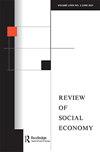一个刚刚不平等的欧盟:为温和的经济不平等辩护*
IF 1.6
Q2 ECONOMICS
引用次数: 1
摘要
在欧洲联盟公民的社会经济分配方面,正义需要什么?欧盟应该减少不同成员国居民之间的跨国家经济不平等,但可能不需要完全的经济分配平等或欧洲的“差异原则”。在准联邦制的欧盟中,个人声称对自己国家控制的事务有更多的政治影响力,这可能会导致一些经济不平等。第1节将这一贡献与欧洲普遍收入的论点联系起来。第2节提供了欧盟的相关特点。第3节考虑了反对某些形式的经济不平等的契约主义论点,而第4节则根据与罗尔斯理论一致的对“社会初级商品”的解释,进一步提出了支持平等分享社会合作利益的论点。第5节认为,经济分配平等的这些原因必须与对个人下属单位控制的事务的更多政治影响相权衡。本文章由计算机程序翻译,如有差异,请以英文原文为准。
A just yet unequal European Union: a defense of moderate economic inequality*
What does justice require concerning socio-economic distribution among citizens of the European Union? The EU should reduce cross-national economic inequalities among inhabitants of different member states, but full economic distributive equality or a European ‘Difference Principle,' may not be required. Individuals' claim to more political influence over matters controlled by their own state in the quasi-federal EU may permit some economic inequality. Section 1 orients this contribution relative to arguments for a European universal income. Section 2 provides relevant features of the EU. Section 3 considers contractualist arguments against certain forms of economic inequality, while section 4 identifies a further argument in favour of equal shares of benefits of social cooperation, based on an interpretation of ‘social primary goods' consistent with Rawls' theory. Section 5 argues that these reasons for economic distributive equality must be weighed against more political influence over matters controlled by the individual’s sub-unit.
求助全文
通过发布文献求助,成功后即可免费获取论文全文。
去求助
来源期刊

REVIEW OF SOCIAL ECONOMY
ECONOMICS-
CiteScore
2.60
自引率
10.00%
发文量
18
期刊介绍:
For over sixty-five years, the Review of Social Economy has published high-quality peer-reviewed work on the many relationships between social values and economics. The field of social economics discusses how the economy and social justice relate, and what this implies for economic theory and policy. Papers published range from conceptual work on aligning economic institutions and policies with given ethical principles, to theoretical representations of individual behaviour that allow for both self-interested and "pro-social" motives, and to original empirical work on persistent social issues such as poverty, inequality, and discrimination.
 求助内容:
求助内容: 应助结果提醒方式:
应助结果提醒方式:


